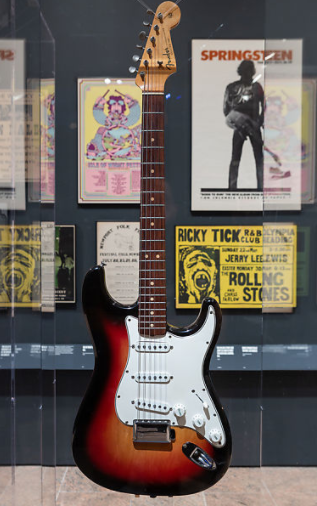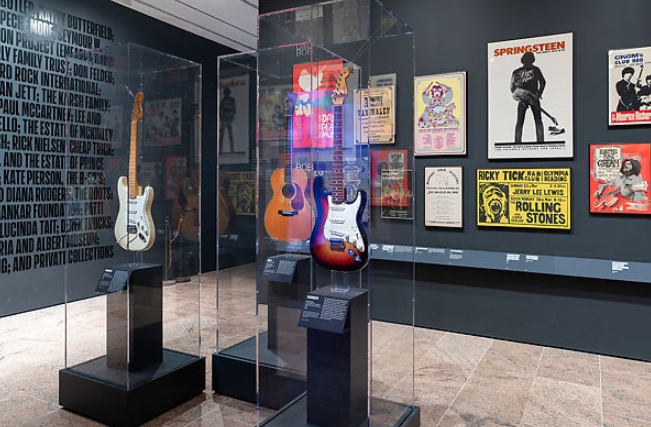The iconic Fender Stratocaster, or Strat, is among the most popular electric guitars in history. The instrument’s design is remarkable with its integrity of the form and function, innovation, and cultural meaning to the history of music. The Fender Stratocaster introduced several design features that contributed to the instrument’s long-term popularity and the development of the music world. Almost 70 years after the legendary electric guitar was introduced, it is still marked by significant popularity and high value. It is an example of an outstanding product whose industrial design performs the primary function: driving innovation and providing high quality to the customer (Matos et al. 2019). This paper aims to discuss the industrial design of the Fender Stratocaster guitar from the perspectives of function, stylistic features, and symbolism.
Description of the Design
The Fender Stratocaster has a notable design that is nearly synonymous with the idea of an electric guitar in many people’s minds. It was introduced by Leo Fender in 1954 in the United States and characterized by innovations such as a contoured body, a big headstock, and a tremolo bridge (Joyce 2010). Furthermore, the Stratocaster was the first model made of two pieces of wood, one for the body and one for the neck. Its length is 39 3/4 in., width is 12 3/4 in., depth is 1 3/4 in., and it weighs around 7-8 lbs. (The Metropolitan Museum of Art n.d.). The instrument has an irregular double-cutaway shape and is characterized by the classic C-shaped neck in older models and the modern C-shaped neck in recently made instruments (Insider 2019). The Fender Stratocaster’s body is traditionally made of alder or ash, while its neck material is maple.
The Fender Stratocaster is often recognizable even for people who are not involved in music. The guitar’s classic colors include the famous Three-Color Sunburst, Black, Olympic White, and Candy Apple Red (Bacon 2010). Fig. 1 depicts Bob Dylan’s Sunburst Fender Stratocaster with a contoured alder body, maple neck, and tremolo bridge that was exhibited at The Metropolitan Museum of Art in 2019 (The Metropolitan Museum of Art n.d.). Fig. 2 showcases a model in Olympic White on the left. Overall, the design of the Fender Stratocaster integrates form and function.


Style and Symbolic Meaning
The style and symbolic meaning of the Fender Stratocaster’s electric guitar are particularly important to discuss. The whole design is about innovation and producing high-quality sound which is pivotal to the music industry (Chafe 2007). The Fender Stratocaster was characterized by a futuristic style that gained public attention and resulted in a worldwide impact on the appearance and functionality of an electric guitar. From today’s perspective, the Fender Stratocaster can be considered vintage when it has such features as a classic C-shaped neck, decals, and traditional color options (Bacon 2010). However, as the design changed and improved with time, it resulted in a more modern style in the contemporary guitars. In particular, modern C-shaped necks are used, and new colors have been released.
The Fender Stratocaster became a design icon due to Leo Fender’s innovative approach, which embodied creativity and individuality. Furthermore, the form derived from practical requirements; a double-horned shape aimed to provide a better balance and easier access to notes for the musician (Bacon 2010). The guitar’s contour body was designed to fit into the player’s torso comfortably. Therefore, these specific symbolic elements of design transformed the instrument from a tool into an archetype. The whole appearance of the Fender Stratocaster refers to creativity, liberty, and diversity reflected in the rock ‘n’ roll culture. While it primarily represents its original era, the instrument has value for the modern culture and community as an influential product that established the basis for modern electric guitars. It is of particular significance for people interested in vintage and classic styles as well as the functionality and elegant look of the instrument.
History and Historical Context
The historical context of the Fender Stratocaster’s design must be discussed. The instrument belonged to the wave of the mid-century modern American designs (Joyce 2010). The Stratocaster has a long history and was essentially designed as Fender’s more sophisticated instrument than his previous projects. Its predecessors include the Fender Telecaster, the Esquire, and the Broadcaster, who shared a similar body shape; however, the Stratocaster is remarkable with its comfortably contoured body, an extra pickup, and a vibrato unit (Bacon 2010). Therefore, it can be considered an enhanced version of the previous Fender designs. Furthermore, the Fender Stratocaster has a special symbolic meaning since its design adapted to several generations of musicians and various styles of music. This instrument primarily reflected the rebellious culture of rock ‘n’ roll and significantly affected the baby boomer generation in terms of style.
To summarize, the Fender Stratocaster is a classic industrial design that revolutionized popular culture and transcended the music industry. It remains one of the most widely sold electric guitars in the world due to its integration of functionality and elegant form. The instrument’s innovation and creativity not only had a significant impact on mass production and the music industry but also shaped the style of several generations. The Fender Stratocaster is remarkable with its adaptivity, compatibility with various styles of music, and a combination of function, unique stylistic features, and symbolism. These features turned it into an iconic electric guitar and a cultural symbol for individuality, artistry, and rebelliousness.
References
Bacon, Tony. 2010. 60 Years of Fender: Six Decades of the Greatest Electric Guitars. 2nd ed. Milwaukee, WI: Backbeat Books.
Chafe, Paul. 2007. “Rockin’ the Rock: The Newfoundland Folk/Pop “Revolution”.” Newfoundland and Labrador Studies 22 (1): 345.
Insider. 2019. “How Fender Guitars Are Made | The Making Of.” YouTube video. Web.
Joyce, Malcolm John. 2010. “The Fender Stratocaster Electric Guitar: A Case Study for Both Nontransferable and Transferable Skills Learning in a Generalist Electronic Engineering Cohort.” IEEE Transactions on Education 53 (3): 397–404. Web.
Matos, Demétrio, Terroso, Miguel, and Sampaio, João. 2019. “The Growing Path in Search of an Industrial Design Identity.” Procedia CIRP 84: 353–56. Web.
The Metropolitan Museum of Art. n.d. “Stratocaster.” 2021. Web.